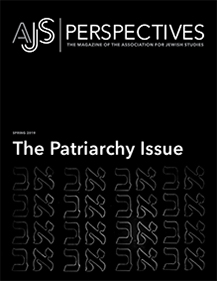edited, abridged, and published anonymously to conform to publication requirements
In June 2006, a distinguished professor planted his open mouth on mine. Ever since I lodged a complaint about this incident with the university in April 2013, it’s become a large part of my professional identity. But, as damaging as that instance of sexual harassment/assault was to my psyche and my career, that isolated personal violation was far less devastating to me than the more systemic damage I have sustained from patriarchal structures in academic Jewish and Biblical Studies. I am facing the likely prospect of having to leave academia, and to find some other means for financial survival. I see this new development as an indirect outcome of my struggles with a powerful institution. This abuse is the most prolonged of my #MeToo experiences.
What follows is not a report or analysis. Abuses of power rely so heavily on hints below the surface, unspoken or barely spoken sophistries, and plausible deniability. So often, they cannot be described in familiar logical forms of narrative, even to insiders who are familiar with the cultural norms, structure, institutions, and even personalities involved. And so, I present here two snapshots out of my thick scrapbook: one partially annotated memory of the beginning of the process of “speaking out,” and one follow-up email that I leave to speak for itself. (I trust that it also bespeaks the silences and silencing that it reflects, reveals, and conceals.)
1. Lodging a complaint: April, 2013.
The harassment officer was immediately responsive. What relief! Policies have been established; there is a process and people care! I can lay my burden down, and the fixers will do whatever they do to repair this kind of thing.
Our first phone call, and the officer suggests a meeting of the three of us: her, me, and him.
Oh. This is not what I expected.
She says I can bring somebody along for support. But whom can I even confide in? Who can help me with something so personal, and so professionally significant, and therefore even more existentially personal, especially when concerned friends all advise me not to pursue something so potentially dangerous? But she’s the “expert.” If this is how things are done …
a. I want an acknowledgment of wrongdoing. I want recognition of an ongoing problem. I want a statement that he will get help and that he will stop his well-known pattern of harassing women.
b. I want the department to host a workshop on sexual harassment. What I don’t want is for the department to shrug off his behavior as “just him being him.”
c. For the sake of other victims, I want him to issue a public apology. I want to help right a wrong that has been tolerated for too long.
Update: My requests were ignored. Other complainants came forward. The institution submitted two other complaints, but omitted mine, falsely giving an impression that my complaint came after the statute of limitations. The emeritus professor was issued a warning, but continued to be honored by the institution. In contrast, I was subject to humiliations and erasure. He subsequently misused his position yet again and committed further assaults. He was barred from campus, and subjected to other punitive measures. My requests for a process of restorative justice were not implemented.
2. Six years after my complaint, thirteen years after I was assaulted, in the era of #MeToo, can we as an academic community move beyond the gossip and voyeurism? Now that it is thankfully no longer politically correct to blame victims, can we move beyond the blaming of victimizers and focus on reconciliation?
With these questions in mind, I write and send an email to the institution that mistreated me and mishandled my complaint:
7 October 2018. From
Subject: Secondary victimization, post-Kavanaugh confirmation

I understand that from your perspective, this might not yet be a propitious time for me to reiterate my pleas to collaborate in a process of restorative justice and healing. In light of current events, both personal and political, it feels like an appropriate time for me to try asking again. And even to have some small hope that this time, there might be some ability for people to hear and reply to my requests with compassion and understanding.
I am writing to ask you to please acknowledge and apologize for the personal hurt and professional damage that I incurred due to second(ary) harassment by
I am writing to offer you the opportunity to distinguish yourselves from the despicable behavior we’ve seen in the last week. It is hard to be put in the position of suffering sexual harassment at work and not knowing whom to turn to or how to protect yourself. It is worse when afterward you are quietly ignored, shunted towards the idea that it is your responsibility alone to create healing and to “move past” the sexual harassment that was suffered in the first place. It is that much harder when people who are meant to be allies and protectors humiliate, misrepresent, silence, and malign the victim in order to minimize institutional and their own personal responsibilities.
The callous indifference, deception, and character assassination that I was subjected to by
With thanks in advance in the hopes that you will reply in a genuine and genuinely compassionate manner, etc.
UPDATE: None. This e-mail received no response.
I am no longer awaiting an answer. In 2006, I cried silently to myself, feeling that I must somehow be so horribly flawed to have fallen victim to a predator. In 2013, I cried out as though in “a field” (cf. Deuteronomy 22:27), with almost none (willing) to hear. In 2018, my voice is becoming audible as part of a growing chorus. Will the response repair the damage that has been done?

